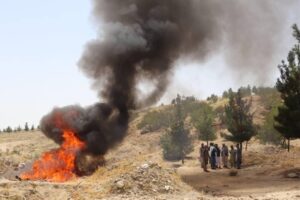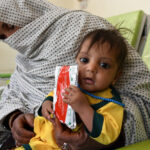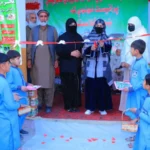The American Bar Association has urged all governments to recognize and prevent genocidal actions against the Hazara people and other persecuted minority groups in Afghanistan.
In a report to the U.S. Congress, the association stated that the Hazara people have been victims of violent acts and indescribable mass killings by various rulers in Afghanistan since the late 19th century, and this trend continues to this day.
The American Bar Association called for action from the Office of Global Criminal Justice at the U.S. Department of State to promote justice and accountability efforts to end impunity for genocide in Afghanistan.
Additionally, the association has urged the U.S. Congress to strengthen national, regional, and international frameworks aimed at preventing mass atrocities in Afghanistan and protecting at-risk groups such as the Hazaras.
The association provided a brief overview of certain events that it claims have contributed to the worsening human rights situation for the Hazara people and equate to genocide.
The report noted that the first recorded instance of a brutal massacre against the Hazaras occurred during the reign of Abdur Rahman Khan, a Pashtun ruler from 1880 to 1901, during which nearly 60% of the Hazaras were massacred and displaced to neighboring countries and Central Asia.
The report stated that Abdul Rahman Khan classified the Hazaras as “infidels,” and through rape and murder, he depopulated Hazara regions and issued royal decrees allowing Pashtun nomads (Kochis) to use Hazara lands.
The American Bar Association emphasized that the discrimination and dehumanization employed by Abdul Rahman Khan to justify the persecution of the Hazaras were again utilized by the current regime in the 1990s.
Afshar Massacre
Also, the American Bar Association report quoted Human Rights Watch as saying that during the jihadist organization’s wars from 1992 to 1993, there was “compelling evidence” that the factions regularly and deliberately targeted civilians and civilian areas for attack. And they shot at civilian areas recklessly and indiscriminately. According to this report, in February 1993, Jamiat-e-Islami and Ittihad-e-Islami forces clashed with Hizb-e-Vahdat forces in Afshar area of Kabul. Although it is said that Hizb-e-Vahdat forces fled the area, Jamiat and Ittihad factions during the ground attack on Hazaras attacked. The American Bar Association wrote that other reports indicated that elderly people, women, children and even their dogs were beheaded and their bodies dumped in wells. This is in addition to eyewitness accounts of rape, torture, kidnapping, looting, and forced labor.

Massacre of Mazar-e-Sharif
The American Bar Association’s report on the killing of mostly Hazara civilians by the forces of the current government in Mazar-e-Sharif states that although the Hazaras were persecuted by the Rabbani government (1992-1996), the re-emergence of the current government at that time created other major problems for the security of this ethnic group created.
In this report, citing Human Rights Watch, it is estimated that between 2,000 and 5,000 civilians were “systematically and brutally executed” in the city of Mazar-e-Sharif in August 1998 during the reign of the current government at that time. Experts noted that the violence was “a killing spree fueled by racial and religious prejudices.”
Yakavelang Massacre in 2001
Also, in a part of the report of the American Bar Association, it is stated that in January 2001, the forces of the current government at that time, conducted a search operation in Yakavalang Bamyan and arrested 300 civilian men.
According to this report, these people were taken to certain gathering points and then shot by the firing squad in public view.
The association stressed that the current government at the time intended these heinous acts as “collective punishment” for local residents who collaborated with opposition forces.
The Continuation of Acts of Genocide
The American Bar Association said in its report that the genocide of Hazaras continues to this day.
According to the report of this association, since the time of Abdul Rahman Khan, many of those who held power in Afghanistan, including the current government and newer factions such as ISIS Khorasan, have continued to commit crimes against Hazaras.
Even in other countries, Hazaras are no longer safe and are at risk of violence and forced exile by other governments in the region, the report said.

Conflict between Hazaras and Nomads
Also, in the report of the American Bar Association, the conflict in Hazarejat, especially Ghazni and Wardak Square, between the Pashtun nomads and the Hazaras over grazing land is also mentioned.
The report states that Abdul Rahman Khan’s actions in confiscating land from the Hazaras and giving it to the nomad through a royal decree had lasting and damaging effects on the Hazara community.
Experts believe that the current administration continues to exploit historical events to continue patterns of violence against Hazaras.
Forced Displacements
The American Bar Association’s report states that forced displacements have become a common tool of the caretaker government against the Hazaras.
The report mentions that thousands of Hazaras from the provinces of Helmand, Kabul, Maidan Wardak, and Balkh have been forcibly removed from their homes over the past three years.
According to the report, in 2021, it is estimated that more than 2,500 Hazara families were compelled to leave their homes, and no legal recourse was provided for them to contest the orders.
The report highlights the violence against Hazaras in Jowzjan, noting that these people are facing forced displacement.
Since the return of the caretaker government to power in Afghanistan, multiple instances of killings of residents in Hazara-dominated areas of the Khass Urozgan district have been reported.













